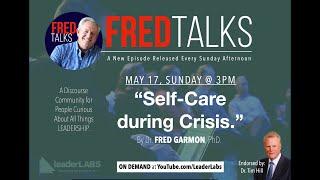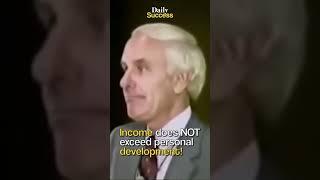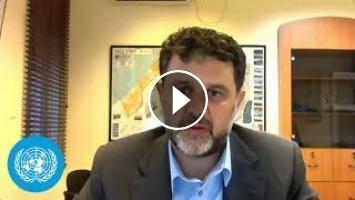Press Conference by Andrea De Domenico, Head of OCHA's Office in the Occupied Palestinian Territory, on the humanitarian situation in the region.
A UN humanitarian official said, “Humanitarian communities and actors’ hands remain tight” in Gaza.
Addressing virtually the press today (16 Apr) from Jerusalem, Andrea De Domenico, Head of the Office for the Coordination of Humanitarian Affairs (OCHA) in the Occupied Palestinian Territory said, “We are 6 months into operation and still do not have all the possible entry points open on a regular basis. It's very problematic. Humanitarian operations are regularly impeded.”
He also said, “There has been a lot of efforts from our side and from the Israeli side to some extent to increase the volume of aid that is going to the North. The point is that famine, as you know, is not only about food: it is a combination of food, sanitation, water, and health facilities. And those to be restored to the decent or minimum standard requires really massive operations that we cannot really, fully do as we speak.”
He continued, “The combination of strategies to make obstacles to the humanitarian assistance is from access denial, but also simple delay at the checkpoint or other type of impediment that will then ultimately not allow the humanitarian community to deliver.”
He also said, “We keep on discussing with the Israeli authority, they promised better coordination with Southern Command. Some progress was made here but still, we are not where we should be.”
De Domenico announced, “We are releasing tomorrow the flash appeal from here to the end of the year. The entire humanitarian community will appeal for 2.8 billion to support the 3 million people identified across the West Bank and Gaza. Of course, 90 percent of it is for Gaza.”
He also stressed, “The process of incoming tracks has always been challenging. It is not only about how many trucks enter but it's also about the ability to bring that assistance to the people. You know, facilitation of humanitarian assistance is not the number of trucks. Facilitation humanitarian assistance is when we reach people that need wherever they are, and that's what we're discussing with Israel.”
Answering a question, he said, “An operation in Rafah would have such a large impact on 1.3 million people, and if you count also the area around Rafah, it’s even more. It's monumental. It would take a gigantic effort from the entire humanitarian community, and one of the biggest challenges will be access to water, which is absolutely, as you can imagine, lifesaving. We fear that our voice is not necessarily heard.”
He also said, “There are 26 hospitals that are completely out of service, and there are 6 field hospitals that are currently operating. A lot of discussions also to eventually extend those further. Only 30 percent of primary healthcare facilities are functional, and we have 20 emergency medical teams that are supporting what remains of the health facilities in Gaza.”
A UN humanitarian official said, “Humanitarian communities and actors’ hands remain tight” in Gaza.
Addressing virtually the press today (16 Apr) from Jerusalem, Andrea De Domenico, Head of the Office for the Coordination of Humanitarian Affairs (OCHA) in the Occupied Palestinian Territory said, “We are 6 months into operation and still do not have all the possible entry points open on a regular basis. It's very problematic. Humanitarian operations are regularly impeded.”
He also said, “There has been a lot of efforts from our side and from the Israeli side to some extent to increase the volume of aid that is going to the North. The point is that famine, as you know, is not only about food: it is a combination of food, sanitation, water, and health facilities. And those to be restored to the decent or minimum standard requires really massive operations that we cannot really, fully do as we speak.”
He continued, “The combination of strategies to make obstacles to the humanitarian assistance is from access denial, but also simple delay at the checkpoint or other type of impediment that will then ultimately not allow the humanitarian community to deliver.”
He also said, “We keep on discussing with the Israeli authority, they promised better coordination with Southern Command. Some progress was made here but still, we are not where we should be.”
De Domenico announced, “We are releasing tomorrow the flash appeal from here to the end of the year. The entire humanitarian community will appeal for 2.8 billion to support the 3 million people identified across the West Bank and Gaza. Of course, 90 percent of it is for Gaza.”
He also stressed, “The process of incoming tracks has always been challenging. It is not only about how many trucks enter but it's also about the ability to bring that assistance to the people. You know, facilitation of humanitarian assistance is not the number of trucks. Facilitation humanitarian assistance is when we reach people that need wherever they are, and that's what we're discussing with Israel.”
Answering a question, he said, “An operation in Rafah would have such a large impact on 1.3 million people, and if you count also the area around Rafah, it’s even more. It's monumental. It would take a gigantic effort from the entire humanitarian community, and one of the biggest challenges will be access to water, which is absolutely, as you can imagine, lifesaving. We fear that our voice is not necessarily heard.”
He also said, “There are 26 hospitals that are completely out of service, and there are 6 field hospitals that are currently operating. A lot of discussions also to eventually extend those further. Only 30 percent of primary healthcare facilities are functional, and we have 20 emergency medical teams that are supporting what remains of the health facilities in Gaza.”
- Category
- United Nations
- Tags
- UN, United Nations, UNGA
Be the first to comment













